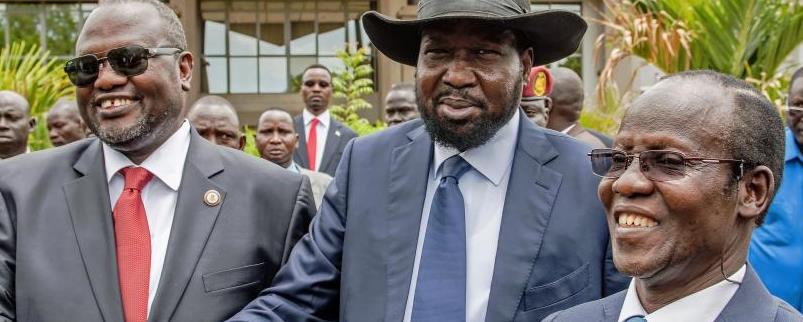The East African regional bloc IGAD has proposed an expansion of the executive to allow South Sudan’s president appoint four deputies for inclusivity in government.
In a draft proposal for power sharing seen by Radio Tamazuj today, IGAD proposed that South Sudan’s cabinet should comprise of the president, the four vice presidents, and the ministers.
The president of South Sudan, according to the new proposal, shall serve as president and executive head of state for a transitional period that will be extended by 36 months preceded by 120 days of a pre-transitional period.
The regional bloc also proposed that the four vice presidents shall oversee the clusters of the Council of Ministers, and generally to supervise the implementation of the reforms outlined in the peace agreement.
“During the Transitional Period, responsibility for governance shall be shared between the current Transitional Government of National Unity, on the one hand, and the parties and entities outside of the Incumbent TGoNU (“the South Sudan Opposition”) on the other hand, as collectives,” reads the document in part.
According to the power sharing proposal, the Council of Ministers, and in other bodies provided for under the peace agreement, 51% for the incumbent government, and 49% for the South Sudan opposition. The proposal further said the Former Detainees should be treated as individual leaders for the purpose of allocation of responsibility and accordingly they will be eligible for a maximum of nine 9 positions. It said the Former Detainees may nominate 2 representatives to serve as ministers, and 1 as a deputy minister.
“The Council of Ministers shall comprise 32 ministries. Incumbent TGoNU: fifty one percent (51%) of ministerial portfolios (15) to be nominated,” said the proposal.
“Sudan People’s Liberation Movement/Army-In Opposition (led by Dr Riek Machar): twenty eight percent (28%) of ministerial portfolios (9 ministers),” adds the proposal.
“Other Armed Groups: twelve percent (14%) percent of ministerial portfolios (4 ministers).”
IGAD also said two ministers will be nominated by the Former Detainees while other political parties will take 7% of ministerial portfolios and will nominate 2 ministers.
The regional bloc also said power sharing ratio in a State within the former States of Jonglei, Unity and Upper Nile as determined in the peace agreement, should be 46% for the incumbent, government, 40% for the armed opposition groups, 2 Former Detainees and opposition parties balance of percentage.
It further said the same ratios should also apply to other states where there is a significant presence or influence of opposition groups which include states within Equatoria and Bahr Ghazal, as determined by the parties.
Responsibility-sharing in the remaining States of South Sudan, according to the proposal, should be according to the ratio of 70% for the incumbent government and 30% for the South Sudan opposition. “The allocation of the South Sudan Opposition shall be shared among the armed and unarmed opposition in accordance with the actual presence or influence of a party or entity within the State concerned,” the proposal said.
IGAD also proposed that the parties will hold elections 60 days before the end of the transition period in order to establish a democratically elected government.




